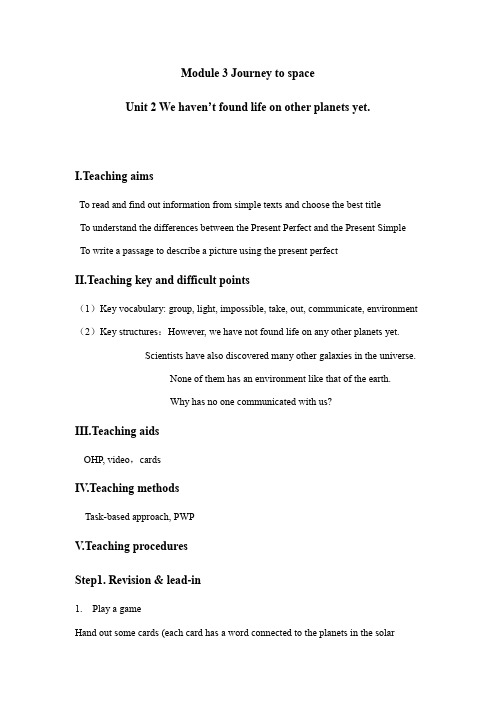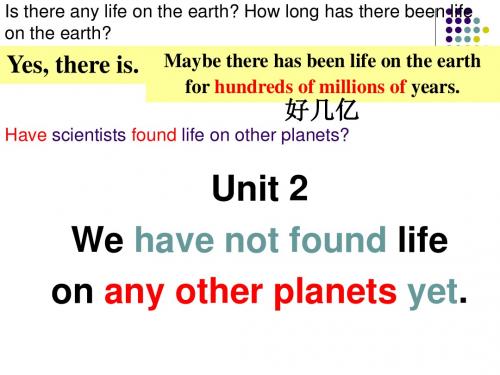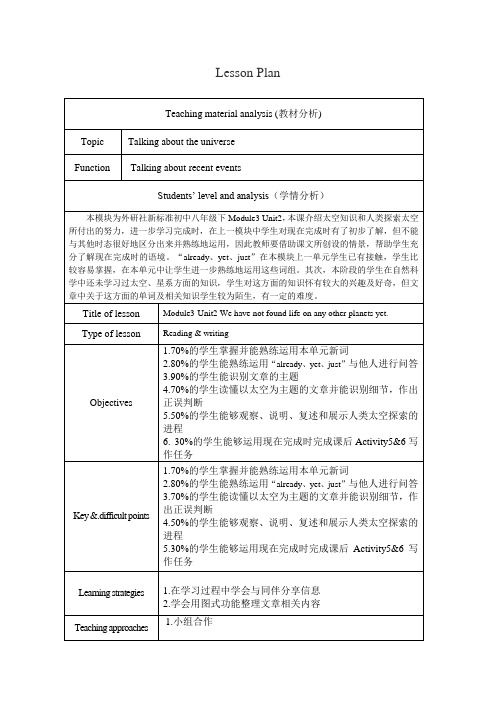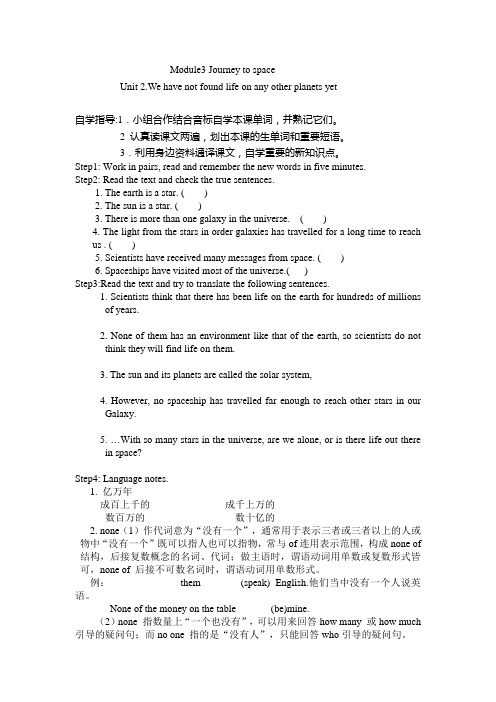新外研版_八年级组下册Module3Unit2We_have_not_found_life_on_any_other_planets_yet
外研版英语八年级下册:Module 3 Unit 2 We have not found life

Module 3 Journey to spaceUnit 2 We haven’t found life on other planets yet.I.Teaching aimsTo read and find out information from simple texts and choose the best titleTo understand the differences between the Present Perfect and the Present Simple To write a passage to describe a picture using the present perfectII.Teaching key and difficult points(1)Key vocabulary: group, light, impossible, take, out, communicate, environment (2)Key structures:However, we have not found life on any other planets yet.Scientists have also discovered many other galaxies in the universe.None of them has an environment like that of the earth.Why has no one communicated with us?III.Teaching aidsOHP, video,cardsIV.Teaching methodsTask-based approach, PWPV.Teaching proceduresStep1.Revision & lead-in1.Play a gameHand out some cards (each card has a word connected to the planets in the solarsystem) then ask them to put the Sun and the eight planets at the right place. The best group with get some prize.2.Ask students to work in groups to discuss the question: Have we found life on other seven planets yet? If not, why? Then lead to this lesson: Unit 2 We haven’t found life on any other planets yet.Step2. Pre-reading1.V ocabularyLook at some pictures and learn the new vocabulary:galaxy, planet, solar system, star, universePut them in order: small – large.2. Free-talkWatch a video about Chang’e III landing on the moon, then ask Ss to work in groups to talk about Chinese spaceships. (Activity 1)Step3.While- reading (Activities 2 & 3)1.Skimming (Activity 2)Ss skim the passage and try to find the best title of the passage.2. Scanning (Activity 3)Ss scan the passage and try to check the true sentences in Activity 3.3.Detailed readingRead Para.1 and answer:1) How long has there been life on the earth?2) Have we found life on any other planets yet?Read Para.2 and answer:The earth is a ______ and it _________ the sun. _______ other planets ___________ the Sun.The sun and its planets are called _____________.Our solar system is part of.____________.There are ________ stars in the Milky Way.Read Para.3 and answer:Scientists ___________ many other_________ in the universe. So it is ________ to imagine____________ the universe is.Read Para.4 and answer:1)Why have scientists sent spaceships to the planet Mars?2)Has any spaceship travelled to reach other stars in our Galaxy?Step 4: Post-reading(Activity 4)1Watch and read2Complete the passage in Activity 4.3 Retell competition --- Memory challengeFirst read the paragraph, then try to retell the passage by looking at the concerning pictures and some hints connected to key words and phrases. The winner will get a prize.Step 5: Writing (Activities 5 & 6)Look at the picture from a science story for children and answer the questions.Eg. What have the scientists just received? (a message from one of our spaceships)They have just received a message from o ne of our spaceships.1)Where has the spaceship landed? (Mars)2)What has the spaceship discovered? (people on Mars)3)Why have the people on Mars not sent us a message? (do not know how to)4)Why have the people on Mars not visited us on the earth? (do not know how to)Write a passage to describe the picture. Use your answers to the questions inActivity 5 to help you.Possible answer: We have just received a message from our spaceship to Mars,and we have discovered people .These people haven't sent us a message because they don't know how to send a message. They haven't visited us on earth because they don't know how to visit us. They have used part of the other spaceship from the earth to make TVs, radios and cars.Step 6 SummarizeWith the help of blackboard deign, let Ss talk about what they learned in this lesson, the teacher give necessary supplements and emphasis.Step 7 Homework1) Read the passage fluently2)Show students a cartoon picture, and then describe the picture orally.。
新外研版八年级英语下册Module3 Unit2 We have not found life on any other planets yet精品课件

Anyone out there ?
Are we alone ?
Is there life out there in space?
Is the universe very large? How large is it?
It is impossible to imagine how et
large
universe
star
solar system
galaxy
the earth the sun (planet) the solar system
(group of stars and planets the Galaxy
an environment go around
billions of stars
1.How long has there been life on Earth ? For hundreds of millions of years. 2. Is the Earth a planet or a star? It is a planet. 3. How many planets are there ?
The planets go around the Sun.
6. What are the sun and its planets called? The sun and its planets are called the solar system.
Para. 3 &4
• 1. Have scientists discovered only one galaxy in the universe? • No, they have discovered many other galaxies. 2. What have scientists done for the space? They have sent spaceships.
外研版八下英语Module 3 Unit 2 We have not found life on

Teaching PlanⅠTeaching content :Module 3 Journey to spaceUnit2 We have not found life on any other planets yet.ⅡTeaching typeReading & writingⅢTeaching aims1.Knowledge aim :To get the methods of reading English passage.2.Ability aim :To improve students’ reading and writing skills.3.Emotion aim: To be proud of China and make contributions to it.ⅣTeaching key points and difficulties1.Key vocabulary-----star、environment、solar system、universe、galaxy2.Key structures----1> We have not found life on any other planets yet.2> Scientists have discovered many other galaxies in theuniverse.3>Scientists have sent spaceships to the planet Mars to takephotos.ⅤTeaching methodCommunicative methodⅥTeaching time40minutesⅦTeaching aidOHPⅧTeaching proceduresStep1 Greetings & lead in1.Greet the students2.Watch a movie about ET to lead in the content of this class.Step2 Pre - reading1.Show students some pictures to present the new words : star 、environment、solar system、universe、galaxy.2.Lead students to read the new words in correct pronunciation ,then read by themselves and correct the mistakes they make.3.Ask students to match the words with the picturesStep3 While-reading1.Watch a video about the passage ,then read it fast and choose the best title for it.2.Read paragraph 1 and answer the two questions.1> How long has there been life on the earth ?2>Have we found life on any other planets yet?3.Check students’ answers.4.Read paragraphs 2 &3,put the words in the box in order(small—large).5.Read paragraphs 4&5,then choose the correct answer.1>Which planet have scientists sent spaceships to take photos?2>Is there life out there in space?Step4 Post-reading1.Read the passage carefully and check the true sentences.1>The earth is a star.2>The sun is a star.3>There is more than one galaxy in the universe.4>The light from the stars in other galaxies has travelled for a long time to reachus.5> Scientists have received many message from space.6>Spaceships have visited most of the universe.2.Give students two topics ,let them six people a group to discuss it.1>Have there been visitors to the earth from other planets?2>Why has no one communicated with us?Step5 Summary & homework1.Make a brief summary of this class.2.Emotional education: Be proud of China and make contributions to it when yougrow up.3.Homework: Write a passage to introduce why you want to be an astronaut.Blackboard designModule 3 Journey to spaceUnit 2 We have not found life on any other planets yet?star G Earthsolar system G Marsuniverse G Venusgalaxy G Saturnenvironment G MercuryG JupiterⅨTeaching reflection。
外研版八年级下Module3 Unit2 We have not found life on any other planets yet课件(共53张PPT)

接龙
幻灯片上单词或短语出现时,同 学应迅速读出并说出中文意思。
每人一词,按行/列依次接龙,3秒 内说不出,此行/列同学即失去此 答题机会,下一行/列同学接续。
P20 Task 1 2 Read the passage and choose the best title for it.
Words review
system
solar system group galaxy universe
n. 系统;体系 星系;(尤指) 太阳系 n. 群;组 n. 星系 n. 宇宙
Words review
light n. 光;光线;光亮 impossible adj. (事情)办不
到的,不可能的 out adv. 在远方 communicate v. 联系;交流
ห้องสมุดไป่ตู้Module 3
Unit 2
We have not found life on any other planets yet.
Words review
none pron. 没有一人;没有 一个;一点儿也 没有 environment n. 环境 that pron. 那;那个(指代 已被提及的事物) solar adj. 太阳的;与太阳有 关的
the Shenzhou VI manned spacecraft
Fei Junlong Nie Haisheng
the Shenzhou Ⅶ manned spacecraft
the Shenzhou Ⅷ manned spacecraft
the Shenzhou Ⅸ manned spacecraft
Words: none alone group light impossible communicate environment out Phrases: hundreds/millions of any other planets go around solar system in the universe Patterns: However, we have not found life on any other planets yet. Scientists have also discovered many other galaxies in the universe.
外研版英语八年级下册:Module 3 Unit 2 We have not found life

M3 U2 We have not found life on any other planets yet教学设计1教学目标知识目标:1).掌握学习与天体名称及八大行星有关单词短语及句子。
Environment, solar, system, group ,galaxy, universe, light, communicate ,system ,possible.Hundreds of millions of; far away; the solar system; in the universe; in space; communicate with.2.)学会用现在完成时来书写两个句子能力目标:1)培养从对天体运行描述中获取有效信息的能力2)能够用清晰的逻辑描述地球与其他天体的联系,读懂相关文章。
情感目标:培养对太空奥妙的兴趣,对科学的热爱。
2.学情分析本课是一堂阅读课。
八年级学生拥有了一定的词汇量,掌握了一些基本的阅读技巧。
本课谈论的宇宙探索Journey to space是一个科普话题。
学生通过阅读获取文本信息的同时,在设计的一些真实的语境中,学习相关的天体名词,能读懂地球与其他行星的关系,激活了学生原有的的语言积累。
3重点难点评论1)、能够从短文中获取有效信息,会用现在完成时描述宇宙探索的有关知识。
(重点)2)、本课的单词及短语以前接触很少,学生阅读科普文章有一定的难度。
(难点)4教学准备评论教学准备:课堂整体运用任务型教学模式以及阅读课“三段式”教学模式。
5教学过程5.1 教学设计5.1.1教学活动活动1【活动】教学设计本课指导学生通过阅读获取信息,培养学生阅读技能。
在教学过程中,采用多媒体手段辅助教学,利用各种图片和习。
外研版八年级下册英语 Module 3 Unit 2 We have not found life

10.【中考·绥化】
ThepopulationofSuihuaismuchsmallerthan______ofHarb C
in.
A. itB. oneC. that
三、根据汉语意思完成句子,每空一词。 11. 众所周知,地球绕着太阳转。 Asweallknow, theearth________________thesun.
A. lonely; alone
B. alone;
lonely
C. lonely; lonely
D. alone;
alone
8.【天津实验中学期中】Tinagotuptogetsomewatertodrink,
butshefoundtherewas_______inthecup. B
A. everythingB. none
外研版八年级下
Module3 Journeytospace
Unit2 Wehavenotfoundlifeonanyotherplanet
syet.
词汇串新知 提示:点击 进入习题
1 planet 6 solar
课文对对碰
二
答案呈现
一 BADCE 1 B
2 around
2B
3 discovered
goesaround
12. 此刻数十亿颗星星都在看着我们呢。 Atthemoment________________starsarelookingatus.
billionsof
13. 他足够强壮,能搬动那张桌子。 Heis________________tomovethattable.
strongenough
lanet
round
Someastronautshavebeentothemoonandscientistshavesent
外研版英语八年级下册:Module 3 Unit 2 We have not found life

Revise the present perfect tense with already, just and yet.
Attract the interest of the students and teach some new word. Lead to universe topics at the same time.
1.Presentthe newwords.
2. Learn the new words and build the relationship of the new words.
1.Learn the reading strategy.
2. Read for Details
A).Consolidate the new words
Title of lesson
Module3-Unit2We have not found life on any other planets yet.
Type of lesson
Reading & writing
Objectives
1.70%的学生掌握并能熟练运用本单元新词
2.80%的学生能熟练运用“already、yet、just”与他人进行问答
D).Retell the sentences.
3.Show three pictures and let them find out Zhang Sijia and tell the reason.
1.Show a spaceship andlet them answer some questions.
外研版八年级英语下册 Module 3 Unit 2 We have not found life

外研版八年级英语下册Module 3 Unit 2 We have not found life on any other planets yet教案外研版八年级下册教案Module3Unit 2 We have not found life on any other planets yetObjectives:Students will be able to understand and use vocabulary related to space exploration and extraterrestrial life.Students will be able to express opinions and speculate about the existence of life on other planets.Students will practice critical thinking and logical reasoning skills by providing evidence and arguments to support their viewpoints. Materials:Whiteboard/markers or projector for displaying prompts.Handouts with relevant vocabulary and discussion questions.Internet access or reference books for students to research and gather information.Procedure:Warm-up activity :Begin the lesson by asking students if they believe there is life on otherplanets.Facilitate a brief class discussion, encouraging students to share their thoughts and reasoning behind their beliefs.Introduce the topic by mentioning recent scientific discoveries related to space exploration.Vocabulary introduction :Write and explain the following vocabulary words on the board: extraterrestrial, exploration, hypothesis, evidence, speculation. Discuss the meaning of each word and provide examples to enhance understanding.Ask students to use the words in context by creating sentences of their own.Reading and discussion :Distribute handouts or display on the board a short reading passage about the search for extraterrestrial life.Ask students to read the passage individually or in pairs.Lead a class discussion based on the reading, encouraging students to express their opinions and thoughts about the possibility of life on other planets.Prompt students with questions such as: “What evidence supports the existence of life on other planets ”, “Why do scientists continue to search for extraterrestrial life ”, “Do you think we will find evidence of lifeoutside Earth in the future ”Research and presentation:Divide the class into small groups and assign each group a specific topic related to space exploration and the search for extraterrestrial life. Instruct students to conduct research using available resources (books, internet, etc.) to gather information and evidence.Ask each group to prepare a brief presentation summarizing their findings, including supporting arguments, and present it to the class. Encourage active participation and engage in a class discussion after each presentation.Conclusion:Summarize the main points discussed during the lesson, emphasizing the importance of scientific exploration and critical thinking.Encourage students to continue exploring the topic and to stay informed about advancements in space research.Conclude the lesson by asking students to write a short reflection on what they have learned and their personal views on the existence of life on other planets.。
外研版英语八年级下册:Module 3 Unit 2 We have not found life

Module3 Journey to spaceUnit 2.We have not found life on any other planets yet自学指导:1.小组合作结合音标自学本课单词,并熟记它们。
2 认真读课文两遍,划出本课的生单词和重要短语。
3.利用身边资料通译课文,自学重要的新知识点。
Step1: Work in pairs, read and remember the new words in five minutes.Step2: Read the text and check the true sentences.1. The earth is a star. ( )2. The sun is a star. ( )3. There is more than one galaxy in the universe. ( )4. The light from the stars in order galaxies has travelled for a long time to reachus . ( )5. Scientists have received many messages from space. ( )6. Spaceships have visited most of the universe.( )Step3:Read the text and try to translate the following sentences.1. Scientists think that there has been life on the earth for hundreds of millionsof years._____________________________________________________________2. None of them has an environment like that of the earth, so scientists do notthink they will find life on them._____________________________________________________________3. The sun and its planets are called the solar system,_____________________________________________________________4. However, no spaceship has travelled far enough to reach other stars in ourGalaxy._____________________________________________________________5. …With so many stars in the universe, are we alone, or is there life out therein space?_____________________________________________________________ Step4: Language notes.1. 亿万年______________________成百上千的______________ 成千上万的________________数百万的_________________ 数十亿的____________________2. none(1)作代词意为“没有一个”,通常用于表示三者或三者以上的人或物中“没有一个”既可以指人也可以指物,常与of连用表示范围,构成none of 结构,后接复数概念的名词、代词;做主语时,谓语动词用单数或复数形式皆可,none of 后接不可数名词时,谓语动词用单数形式。
- 1、下载文档前请自行甄别文档内容的完整性,平台不提供额外的编辑、内容补充、找答案等附加服务。
- 2、"仅部分预览"的文档,不可在线预览部分如存在完整性等问题,可反馈申请退款(可完整预览的文档不适用该条件!)。
- 3、如文档侵犯您的权益,请联系客服反馈,我们会尽快为您处理(人工客服工作时间:9:00-18:30)。
注意:none 与no one(nobody) 的区别:
(1) none既可指人也可指物,通常与表范围的of 短语连用; no one(=nobody)只能指人,不能与of 短语连用。 如:_________ of the reasons was true. A A. None B. No one C. All
planet Mars Spaceships have travelled tothe ___________ _ and_______________________. outside the solar system But not travelled _______________________yet, to other stars in our Galaxy
How many words universe do you remember?
SolarMilk system way
out
communicate
group
planet and it goes around the su The earth is a ______ Seven other planets go around the Sun. _______ The sun and its planets are calledthe ___________ solar system
We do not know the answers…yet.
Check the true sentences:
1. The earth is a star. × 2. The sun is a star. √ 3. There is more than one galaxy in the universe. √ 4. The light from the stars in other galaxies has travelled for a long √ time to reach us. 5. Scientists have received many messages from space. × 6. Scientists have visited most of the × universe.
because it is too_______. far
The 5th Para.
Have scientists discovered any life in outer space yet? No, not yet.
Is there life out the solar system in space?
1. Scientists think that there has been life on the Earth for hundreds of millions of years.
there has been there be 现在完成时态
millions of 数百万 hundreds of 数百 thousands of 成千上万 billions of 数十亿
Complete the passage with the words and expression in the box. communicate environment none solar system universe Is there life on other planets? There are seven other planets in our (1) ____________, solar system but (2)______ none of them has a(n) (3)____________ environment like that of the earth.
1.成百万年 2.在其它的行星上 3.绕太阳转 4.他们中没有人 5.被叫做 6.太阳系 7.一小部分 8.几十亿的星星
millions of years on any other planets go around the sun none of them be called the solar system a small part of billions of stars
When did it come back?
on 29th ot June 2012
Who are the astronauts? Liu Yang, Jing Haipeng, Liu Wang
Is there any life on the other planets?
Read the passage and choose the best title for it.
There has been life on the earth for hundreds of millions of years.
2.Have we found life on any other planets yet? No, we haven’t.
The 2&3rd Para.
1. Which is true?
Liu Yang Jing Haipeng Liu Wang
When did we send it? Where did we send it?
on 16th of June 2012
Jiuquan, Gansu Province.
Thirteen days. How long did it stay in space?
6. So how large is the universe? It’s impossible to imagine. 所以宇宙有多大?我们无从想象。 句型: It is + 形容词 + to + 动词原形, 意思是“做某事很……” e.g. It is difficult to read these words. 读这些单词很难。
alone 在句中作形容词,不作定语只做表语,也可作副词。 意思是“独自地”。 lonely 在句中作形容词,作表语,强调人的感觉。意思是 “孤独的”。
e.g. She was alone in that dark room. And she feels lonely. 她独自一人呆在那黑屋子里。 她觉得很孤单。
(2) none与数量有关,可回答how many问句,表示“一个 也没有”;而no one表示“什么人也没有”,可回答who 问句。如 :are you speaking to?-_________. -Who
-How many students are there in the room? None -_________.
e.g. There are billions of stars in the Galaxy, and our sun is only one of them
2. … our solar system is a small part of a much larger group of stars and planets, called the Galaxy or the Milky Way. ...... 我们的太阳系只是一个由恒星和行 星组成的星系的一小部分,这个星系 比太阳系大得多,称作银河系或银河。
Module 3
Unit 2
We have not found life on any other planets yet.
dahaozhuang School houchunyan
Hale Waihona Puke Try to remember the words as many as possible.
impossible environment light
5. With so many stars in the universe, are we alone, or is there life out there in space?
with + 名词 + 介词短语,表示伴随情 况,意思是“带着……”。 e.g. Mr. Zhang is coming with a book in his hands. 张老师手里带着一书进来了。
√
2.Put the words and expressions from the smallest
to the largest :_____________ B D C A E
A. galaxy B. planet C. solar system D. star E. universe
The 4th Para.
on 16th of June 2012 China sent shenzhou-9to the space
Look at the picture and talk about what you know about Chinese spaceships. Shenzhou-9 is a manned spaceship.
A: Seven planets go around the sun. B: there are only stars in the galaxy. C. The solar system is larger than the galaxy. D: the Environment of the earth is different from that of other planets in the solar system.
3. None of them has an environment like that of the earth, so scientists do not think they will find life on them. none of … 表示(三个以上)一个也没 有。做主语时,谓语动词可用单数或复 数。 e.g. None of us has/have been to the Mars. 我们中没一个去过火星。
